 How do ‘Normal’ phones work?
How do ‘Normal’ phones work?
Traditional telephony networks aka POTS (Plain Old TelephonySystems) are based on a network fabric using TDM (Time DivisionMultiplexing), a technology that’s been around for a longtime.
How does a POTS call work? When a call is established between two phone users, a “virtual circuit” is established between them and a certain amount of bandwidth reserved across that circuit (usually 64Kb/s). That bandwidth is reserved for the lifetime of the call, even if no-one is speaking. As the connection is synchronous, ie. when someone talks, the voice is sent across the network in the sequence that it was said. This occurs until the end of the call.
It’s different with VoIP
With the move to VoIP, voice first gets digitised, turned into small packets, which are then encoded into IP packets, in turn sent across an IP network. The packetisation actually adds overhead (takes longer and adds to the size), leading to VoIP sometimes utilising more network bandwidth than traditional telephony methods. Of course this can be mitigated by using modern CoDecs (the digitisers) which use more compression than traditional telephony. Unfortunately the more compression used, the lower the call quality. In a mobile network, voice is encoded at 13Kb/s (which increases to 20Kb/s+ when packetised – as an example of the overhead). People are used to this reduced quality, despite it being noticeably different from a phone call using a fixed-line.
 Using VoIP over the Internet is a hit and miss thing. We know the Internet is fantastic at coping with problems – if there are network errors, the data is re-routed around the black-spots, and when the error goes or traffic gets congested, it just re-routes the data somewhere else. It’s best to think of the Internet as a loose collection of around 30,000+ networks that happen to interconnect at various places.
Using VoIP over the Internet is a hit and miss thing. We know the Internet is fantastic at coping with problems – if there are network errors, the data is re-routed around the black-spots, and when the error goes or traffic gets congested, it just re-routes the data somewhere else. It’s best to think of the Internet as a loose collection of around 30,000+ networks that happen to interconnect at various places.
Where the re-routing works for general Internet traffic, it’s terrible for VoIP as there’s no guarantee that the VoIP data will arrive in an orderly fashion i.e. the first bit of traffic may go one way, then second another and the third another route completely. Each route will have be working at different speeds, so the 3rd piece of VoIP data may actually arrive at the destination first – imagine the third word of the conversation arriving before the first.
Packets arriving in a different order is expected on the Internet and it was designed with this in mind. IP can reassemble the data and put it all back in the right order, but to do so requires large buffers i.e long delays. Unfortunately for VoIP, delay not is something you want as that’s when calls break-up or crack and pop.
In the trade, the packets arriving at different times (relative to a clock signal i.e. like a metronome) is called Jitter.
 VoIP in an ideal world
VoIP in an ideal world
There are ways to get around this. Such as new technologies like IP/MPLS (IP/Multi Protocol Label Switching) which is a way of ensuring all traffic between two points goes the same way (with back-up routes, in case the primary one fails). It also allows for Quality of Service (QoS) metrics, so VoIP traffic can be prioritised over say Web traffic, minimising Jitter.
Many telecoms companies now run IP networks utilising IP/MPLS, but as they still interconnect over other, public connection points any quality metrics are lost. So as long as all your IP services come from the same supplier, you’re unlikely to be able to maintain QoS.
When does VoIP make sense/when not
VoIP does gives increased flexibility and anyone with a multi-site operation should consider it. If they’re currently paying bills to a telecoms company to transfer calls between sites, the use of VoIP is generally a no brainer, as it give a rapid payback for the added VoIP equipment required.
When to think twice about VoIP
Single site businesses, should be wary. Installing VoIP can consume significant resources when converting from a traditional system in particular using VoIP may require extensive reworking of an internal LAN – you don’t want your phone calls to stop when someone transfers a large file between their PC and the server.
It may be better to look at other options such as Carrier Pre Select (CPS) or Wholesale Line Rental (WLR) or simply another telecom’s provider whose rates are better.
 Security implications and therefore costs are a significant issue. The increase in network traffic that VoIP can bring can have other cost implications, such as ensuring firewalls are “chunky” enough to support the VoIP traffic.
Security implications and therefore costs are a significant issue. The increase in network traffic that VoIP can bring can have other cost implications, such as ensuring firewalls are “chunky” enough to support the VoIP traffic.
One area that isn’t often spoken about, but we feel is a big weakness of VoIP is the potential of all phone calls in and out of the site that are carried over VoIP being lost to a DoS (Denial of Service) attack. Protecting against attacks can be difficult, as the attacks may just look like remote workers trying to establish VoIP calls into the network.
Conclusion
VoIP isn’t a panacea. While it can offer savings and great flexibility, the choice shouldn’t be automatic. Look at the whole picture and work out if there really are savings to be made. If there’s no ROI (Return on Investment), then VoIP is an expensive new toy.
 T-Mobile was told to see the headmaster and returned with a derrier rouge after making exaggerated claims about its “web’n’walk” mobile Internet service.In a wave of PR-driven hyperbole last October, T-Mobile claimed that their Service – which let customers access the web from their mobiles – would “redefine the mobile Internet market” letting people access the net “Internet wherever you are”. (You may also remember that at the time Guy Kewney wondered if Google were behind the service).
T-Mobile was told to see the headmaster and returned with a derrier rouge after making exaggerated claims about its “web’n’walk” mobile Internet service.In a wave of PR-driven hyperbole last October, T-Mobile claimed that their Service – which let customers access the web from their mobiles – would “redefine the mobile Internet market” letting people access the net “Internet wherever you are”. (You may also remember that at the time Guy Kewney wondered if Google were behind the service). T-Mobile had a valiant stab at a defence, arguing that their advert was all about making the distinction between Ye Olde Crappe WAP and their new, full Internet-access, web’n’walk service, adding that they had included the line, “subject to coverage”.
T-Mobile had a valiant stab at a defence, arguing that their advert was all about making the distinction between Ye Olde Crappe WAP and their new, full Internet-access, web’n’walk service, adding that they had included the line, “subject to coverage”. To the sound of a salvo of slapped wrists, the statement concluded that the ad, “was misleading because readers were likely to interpret the claim to refer to geographical network coverage. We told T-Mobile to avoid making such unconditional claims in future advertising.”
To the sound of a salvo of slapped wrists, the statement concluded that the ad, “was misleading because readers were likely to interpret the claim to refer to geographical network coverage. We told T-Mobile to avoid making such unconditional claims in future advertising.” Now holding the record for the fastest-selling debut album in the UK, the success of young British indie-rockers Arctic Monkeys shows how the Web has changed both the way in which bands promote and market themselves and how people find new music.
Now holding the record for the fastest-selling debut album in the UK, the success of young British indie-rockers Arctic Monkeys shows how the Web has changed both the way in which bands promote and market themselves and how people find new music. For less than the cost of a handful of flyers, bands can set up their own Websites, offer free downloadable tunes, sell merchandise, maintain free email mailing lists and invite a dialogue with their fans.
For less than the cost of a handful of flyers, bands can set up their own Websites, offer free downloadable tunes, sell merchandise, maintain free email mailing lists and invite a dialogue with their fans.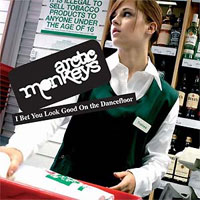 With a growing fanbase clambering for more, it wasn’t long before record companies were begging to sign up the band, and last week’s album release on Domino Records saw the Artic Monkeys record-breaking leap up the charts.
With a growing fanbase clambering for more, it wasn’t long before record companies were begging to sign up the band, and last week’s album release on Domino Records saw the Artic Monkeys record-breaking leap up the charts. How do ‘Normal’ phones work?
How do ‘Normal’ phones work? VoIP in an ideal world
VoIP in an ideal world Security implications and therefore costs are a significant issue. The increase in network traffic that VoIP can bring can have other cost implications, such as ensuring firewalls are “chunky” enough to support the VoIP traffic.
Security implications and therefore costs are a significant issue. The increase in network traffic that VoIP can bring can have other cost implications, such as ensuring firewalls are “chunky” enough to support the VoIP traffic. In a significant new development, Channel 4 will be allowing their viewers to watch their new comedy program, ‘The IT Crowd’ online and on-demand in advance of their TV broadcast.
In a significant new development, Channel 4 will be allowing their viewers to watch their new comedy program, ‘The IT Crowd’ online and on-demand in advance of their TV broadcast.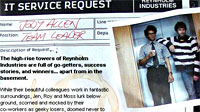 The online debut is a first for a terrestrial broadcaster in the UK and apes a similar strategy employed by US network NBC, which launched the US version of The Office online last year.
The online debut is a first for a terrestrial broadcaster in the UK and apes a similar strategy employed by US network NBC, which launched the US version of The Office online last year.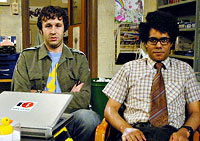 Channel 4 are saying that this is the first time that they’ve premiered a full episode of a new series, adding that they find it “particularly exciting ” to be airing such a “high profile and apposite programme.”
Channel 4 are saying that this is the first time that they’ve premiered a full episode of a new series, adding that they find it “particularly exciting ” to be airing such a “high profile and apposite programme.” The program has already received substantial online coverage already with sites like MSN, Yahoo! and Wanadoo running features, and Channel 4 are hoping that the coverage will help in pull in viewers.
The program has already received substantial online coverage already with sites like MSN, Yahoo! and Wanadoo running features, and Channel 4 are hoping that the coverage will help in pull in viewers.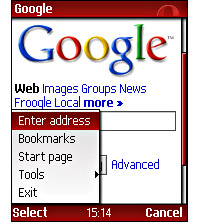 Opera Software have announced the worldwide release of
Opera Software have announced the worldwide release of  As a result of the compression technology, users can surf the Web faster – and those paying for their data traffic can dramatically reduce their bandwidth costs.
As a result of the compression technology, users can surf the Web faster – and those paying for their data traffic can dramatically reduce their bandwidth costs.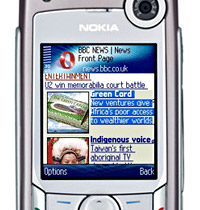 “With Opera Mini most people can start surfing the Web with the mobile phone they have today,” purred Jon S. von Tetzchner, CEO, Opera Software.
“With Opera Mini most people can start surfing the Web with the mobile phone they have today,” purred Jon S. von Tetzchner, CEO, Opera Software. Opera Mini can be freely downloaded by pointing your phone’s WAP browser in the direction of
Opera Mini can be freely downloaded by pointing your phone’s WAP browser in the direction of 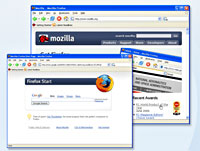 According to figures released by French Web metrics firm XiTi, the open source Mozilla Firefox browser has now grabbed a massive 20% average market share in Europe, creating a growing challenge to the current leader, Microsoft Internet Explorer.
According to figures released by French Web metrics firm XiTi, the open source Mozilla Firefox browser has now grabbed a massive 20% average market share in Europe, creating a growing challenge to the current leader, Microsoft Internet Explorer.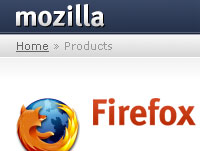 Over here in Blighty, it seems that the Brits are yet to be wooed by the might of Mozilla, with the country recording one of the lowest proportions of Firefox users in Europe – just 11%.
Over here in Blighty, it seems that the Brits are yet to be wooed by the might of Mozilla, with the country recording one of the lowest proportions of Firefox users in Europe – just 11%.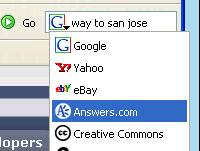 Other Web metrics companies have produced somewhat less spectacular estimates of Firefox’s market share, with OneStat.com reporting in November last year that the browser had notched up a global market share of 11.5%.
Other Web metrics companies have produced somewhat less spectacular estimates of Firefox’s market share, with OneStat.com reporting in November last year that the browser had notched up a global market share of 11.5%.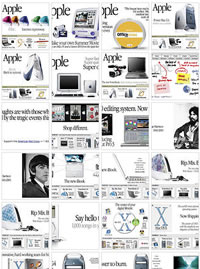 Friday afternoon distractions.
Friday afternoon distractions. Internet auctioneer eBay have cancelled their plans to allow live pets to be sold on its Web site after receiving a barrage of complaints from users.
Internet auctioneer eBay have cancelled their plans to allow live pets to be sold on its Web site after receiving a barrage of complaints from users. As company spokesman Hani Durzy explained, users were concerned that the listings would encourage unsanitary ‘puppy mills’, where animals are sometimes bred in less-than ideal conditions, and that it might prove difficult working out legitimate animal shelters and the get-rich-quick scamsters.
As company spokesman Hani Durzy explained, users were concerned that the listings would encourage unsanitary ‘puppy mills’, where animals are sometimes bred in less-than ideal conditions, and that it might prove difficult working out legitimate animal shelters and the get-rich-quick scamsters.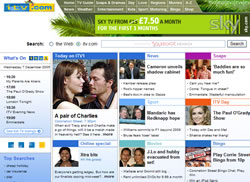 The Digital-Lifestyles office is in a state of total confusion over major UK broadcaster,
The Digital-Lifestyles office is in a state of total confusion over major UK broadcaster,  The school leavers departing since the wide use of the Internet, will not have to resort to third-party services – the majority of them will have an online presence, allowing direct contact, if desired.
The school leavers departing since the wide use of the Internet, will not have to resort to third-party services – the majority of them will have an online presence, allowing direct contact, if desired. For techie-obsessives like the Digital Lifestyles crew, keeping connected when we’re away from home is right up there with finding a roof over our heads, so when we went off to New York, we made sure we packed our Sony laptop and Wi-Fi enabled smartphone – even on holiday.
For techie-obsessives like the Digital Lifestyles crew, keeping connected when we’re away from home is right up there with finding a roof over our heads, so when we went off to New York, we made sure we packed our Sony laptop and Wi-Fi enabled smartphone – even on holiday. One rather unfortunate side-effect of all this free connectivity was that once-bustling cafes turned into conversation-free libraries, with rows of transfixed surfers staring intently into their screens, with the silence only broken by intermittent bursts of keyboard activity.
One rather unfortunate side-effect of all this free connectivity was that once-bustling cafes turned into conversation-free libraries, with rows of transfixed surfers staring intently into their screens, with the silence only broken by intermittent bursts of keyboard activity. On the street, one handset seemed to be stuck in almost every New Yorker’s hand: the Palm Treo 750. They love the phone!
On the street, one handset seemed to be stuck in almost every New Yorker’s hand: the Palm Treo 750. They love the phone!